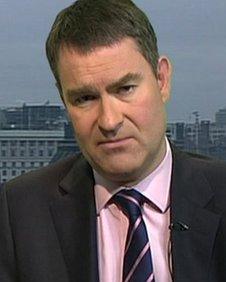Island tax evaders told to come clean before crack down
- Published

Mr Gauke says £1bn in previously unpaid tax could be recovered
Tax evaders using the Crown Dependencies to hide assets and investments have been told to pay the tax they owe before a clamp down.
The move by HM Revenue and Customs (HMRC) follows the signing of tax sharing agreements between the UK and the Isle of Man, Jersey and Guernsey.
Tax evaders have until September 2016 to disclose hidden assets and pay the tax, interest and any penalties due.
Those who ignore the opportunity could face criminal prosecution.
According to the UK Exchequer Secretary David Gauke, the move could bring in more than £1bn in previously unpaid tax over the next five years.
Following the deadline, HMRC will automatically receive information from banks in Jersey, Guernsey and the Isle of Man identifying all account holders.
Mr Gauke said: "The net is closing in on those seeking to hide their money offshore to evade their tax responsibilities.
"While the majority of people and businesses pay what they owe, this government is determined to tackle the minority of tax evaders who don't."
'Doesn't add up'
Guernsey's Treasury Minister, Gavin St Pier, doesn't believe the UK Exchequers' sums add up.
He said: "For many years tax evasion has been a reportable offence under our anti-money laundering legislation.
"We have had automatic exchange of information under the European Union's savings directive and therefore we don't believe there is going to be any significant sums reportable under this disclosure facility."
HMRC's Jennie Granger said they are making sure that there is "no safe haven for people who want to try and cheat the tax system by hiding their money overseas".
"These disclosure facilities give an opportunity for individuals with investments in the Isle of Man, Guernsey or Jersey to make a voluntary disclosure of any undeclared tax liabilities before we challenge them."
She added that people with overseas assets or investments who have correctly declared income to HMRC and paid tax have "nothing to fear."
Those who ignore the opportunity could face criminal prosecution, significantly higher penalties, and the risk of having their names published, according to HMRC.
- Published20 February 2013
- Published21 February 2013
- Published28 January 2013
- Published19 February 2013
- Published20 February 2013